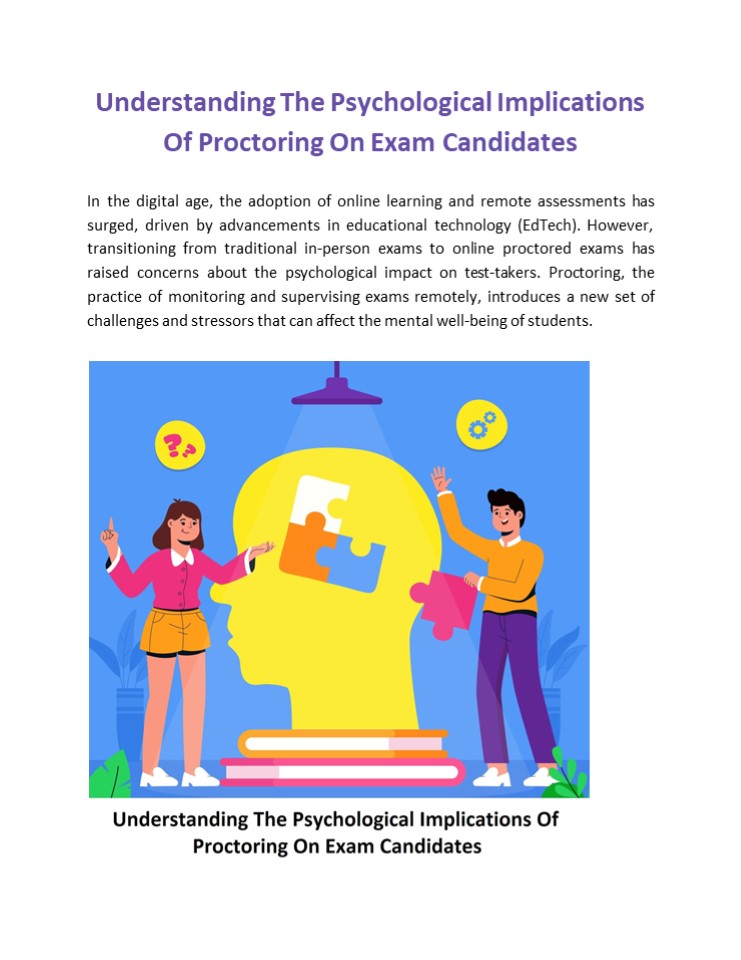Understanding The Psychological Implications Of Proctoring On Exam Candidates
Title: Understanding The Psychological Implications Of Proctoring On Exam Candidates
1
Understanding The Psychological Implications Of
Proctoring On Exam Candidates
In the digital age, the adoption of online
learning and remote assessments has surged,
driven by advancements in educational technology
(EdTech). However, transitioning from traditional
in-person exams to online proctored exams has
raised concerns about the psychological impact on
test-takers. Proctoring, the practice of
monitoring and supervising exams remotely,
introduces a new set of challenges and stressors
that can affect the mental well-being of students.
2
- Let's explore the impact of proctoring on
test-takers from a psychological perspective. - Anxiety And Stress The presence of remote
proctors or AI proctors during online exams can
evoke feelings of anxiety and stress among
test-takers. The heightened sense of scrutiny and
surveillance can create a pressure-cooker
environment, leading to performance anxiety and
test anxiety. Test-takers may experience fear of
being watched or judged, impacting their ability
to concentrate and perform to the best of their
abilities. The psychological burden of online
proctoring can exacerbate existing stressors and
mental health challenges, particularly for
students with test-related anxiety disorders. - Psychological Safety And Well-being Promoting
psychological safety and well-being should be a
priority in designing and implementing online
proctoring solutions. EdTech companies and
proctoring providers must prioritize the mental
health and emotional needs of test-takers,
ensuring that proctored exams are conducted in
a supportive and inclusive manner.
Transparent communication, clear guidelines, and
proactive support mechanisms can help alleviate
test-taker's concerns and mitigate the
psychological impact of proctoring. - Loss Of Autonomy And Control Online proctoring
imposes restrictions and limitations on
test-takers, eroding their sense of autonomy and
control over the testing environment. The
invasive nature of proctoring technologies, such
as screen monitoring and webcam surveillance, can
make test-takers feel like they are under
constant surveillance, diminishing their sense of
privacy and personal space. Losing control over
one's testing environment can contribute to
feelings of powerlessness and disempowerment,
affecting psychological well-being and academic
performance.
3
- Trust And Ethics Concerns Implementing online
proctoring raises concerns about trust and ethics
in the assessment process. Test-takers may
question the fairness and integrity of proctored
exams, especially in cases where privacy
violations or technical glitches occur. The
reliance on AI proctors and automated monitoring
systems further complicates trust dynamics, as
test-takers may distrust the impartiality and
accuracy of algorithmic decision-making.
Addressing trust and ethics concerns is essential
for maintaining the psychological well-being and
confidence of test-takers in online assessment
environments. - Perceived Invasiveness And Intrusiveness The
intrusive nature of online proctoring
technologies can evoke discomfort and invasion of
privacy among test-takers. The constant
monitoring of keystrokes, eye movements, and
facial expressions can feel invasive and
intrusive, undermining the sense of psychological
safety and trust in the testing environment.
Test-takers may perceive online proctoring as a
violation of their boundaries and autonomy,
leading to psychological distress and resistance
to the proctored exam experience. - Conclusion
- The transition to online proctored exams has
significant implications for the psychological
well-being of test-takers. Anxiety, stress, loss
of autonomy, trust concerns, and perceived
intrusiveness are among the psychological
challenges faced by test-takers in proctored exam
environments. EdTech companies and proctoring
providers must recognize and address these
psychological concerns to ensure a positive and
supportive testing experience for all
stakeholders.
4
By prioritizing psychological safety and
well-being, we can create a more inclusive and
equitable online assessment ecosystem that
fosters academic success and personal growth.
EnFuse Solutions excels in prioritizing the
psychological well-being of online exam-takers,
offering expertise and strategies that create a
supportive, secure environment, making them ideal
for addressing such concerns. Read More The
Future Of Proctoring Predict How Proctoring
Technology Will Continue To Evolve And How It
Will Shape The Future Of Education

